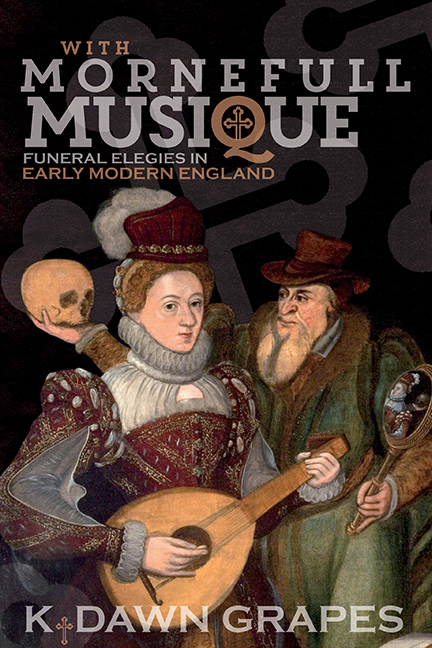 With Mornefull Musique: Funeral Elegies in Early Modern England
With Mornefull Musique: Funeral Elegies in Early Modern England Book contents
- Frontmatter
- Contents
- List of Figures
- List of Music Examples
- Acknowledgements
- Editorial Conventions
- Introduction
- 1 “With Mornefull Musique”: The English Musical Funeral Elegy
- 2 “The Floure of England”: The Earliest Musical Elegies for Sir Philip Sidney
- 3 “Of Griefe and Honour Still”: Elizabethan Courtiers
- 4 “Say Death Hath Lost”: Knights of the Realm
- 5 “Weepe Forth Your Teares”: Laments for a Lost King
- 6 “A Flower of Beutye”: The Feminine Legacy of Queens and Matriarchs
- 7 “For Death of Her”: The Unusual Case of Mary Gascoigne
- 8 “And Music Dies ...”: Musicians and their Stories
- Epilogue
- Appendix: Recordings List
- Select Bibliography
- Index
- Titles listed here were originally published under the series title Music in Britain, 1600–1900
- New titles published under the series title Music in Britain, 1600–2000
1 - “With Mornefull Musique”: The English Musical Funeral Elegy
Published online by Cambridge University Press: 17 October 2019
- Frontmatter
- Contents
- List of Figures
- List of Music Examples
- Acknowledgements
- Editorial Conventions
- Introduction
- 1 “With Mornefull Musique”: The English Musical Funeral Elegy
- 2 “The Floure of England”: The Earliest Musical Elegies for Sir Philip Sidney
- 3 “Of Griefe and Honour Still”: Elizabethan Courtiers
- 4 “Say Death Hath Lost”: Knights of the Realm
- 5 “Weepe Forth Your Teares”: Laments for a Lost King
- 6 “A Flower of Beutye”: The Feminine Legacy of Queens and Matriarchs
- 7 “For Death of Her”: The Unusual Case of Mary Gascoigne
- 8 “And Music Dies ...”: Musicians and their Stories
- Epilogue
- Appendix: Recordings List
- Select Bibliography
- Index
- Titles listed here were originally published under the series title Music in Britain, 1600–1900
- New titles published under the series title Music in Britain, 1600–2000
Summary
An Eligie in memorie of Master Thomas Hynson
With mornefull Musique, now remember him,
that while hee liu'd, did oft remember thee,
and fill'd his Musiques Fountaine to the brimme,
with thy sweet songs and pleasant harmony,
who was to Master, Children and to frend,
so faithfull, kinde and true as no man more,
so wise, so learnd, so carefull of his ende,
as grac'd his liuing actions, and therefore,
his death with sobbes & sighes I will deplore,
And wish to die, to liue in heau'nly blisse,
where worthie Hynson, through gods mercie is.
JOHN Amner's song “With Mournful Music” commemorates the life of Thomas Hinson, a self-made, land-owning gentleman who served as righthand administrator for the Earl of Bath. A composition for six voices that might be doubled by viols, Amner carefully placed the musical tribute as the final song in his printed collection of music, Sacred Hymnes of 3. 4. 5 and 6. parts (1615). There it stood as a memorial to Hinson, a notated aural remembrance akin to the stone effigies one might find in any English cathedral.
Musical elegies for specified honorees first appeared in London during the reign of Elizabeth I. In the years that followed, these commemorative songs flourished, taking their place in a culture infused with images, texts, and other reminders that death comes to everyone. Unlike today's Western society, where death is viewed as something that happens “some day” – in the future – philosophies of death in early modern England were completely intertwined with how to live each day. Disease, plague, childbirth mortality, and political and religious executions kept it in the forefront of daily personal experience. By today's standards, the average life expectancy was much lower, about half, especially for those living within cities. Music inspired by death came in the form of liturgical anthems and motets composed for inclusion in the Anglican burial service and the outlawed, but still practiced, Catholic Mass and Offices for the Dead. Liturgical death music was a direct extension (even in the relatively newly defined Anglican service) of a long-established tradition. Musical elegies in honor of a specific person, however, were something new. These secular songs stood for much more than simple commemoration.
- Type
- Chapter
- Information
- With Mornefull Musique: Funeral Elegies in Early Modern EnglandFuneral Elegies in Early Modern England, pp. 4 - 30Publisher: Boydell & BrewerPrint publication year: 2018


